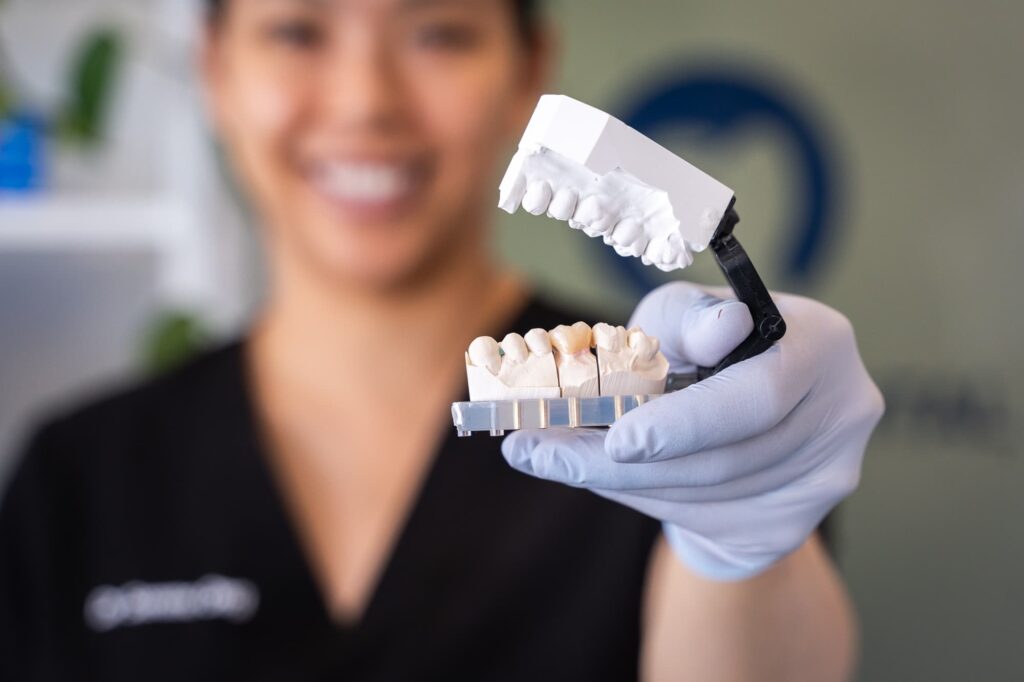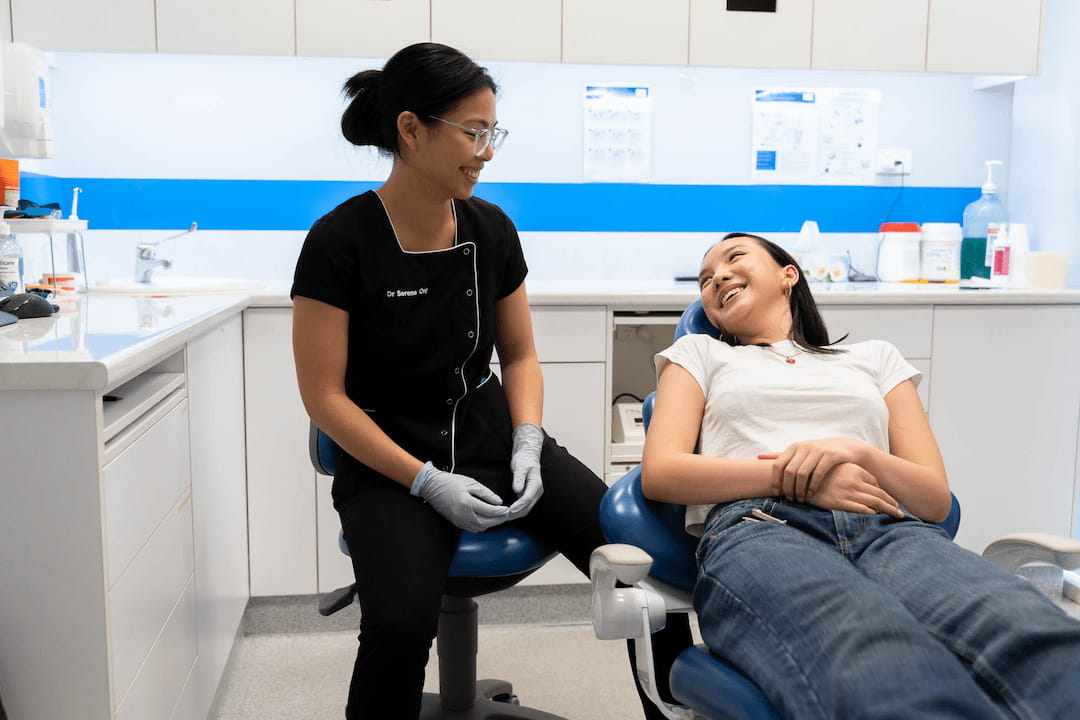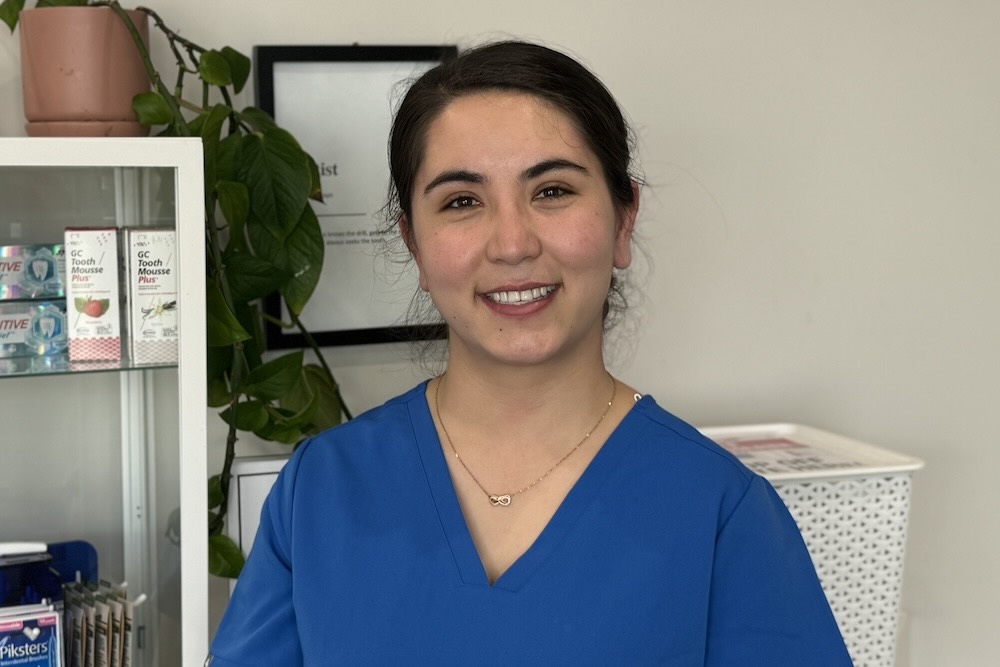Tooth Erosion
What is Tooth Erosion?

What is Tooth Erosion?
Tooth erosion is the irreversible loss of enamel caused by acids—not bacteria—from food, drinks, or internal sources like reflux or vomiting. Unlike tooth decay, which is bacterial, erosion gradually wears down the enamel, exposing the softer dentine underneath.
This can lead to sensitivity, yellowing, and a higher risk of damage. Because enamel doesn’t regenerate, early detection and professional care are essential.
Your teeth deserve lasting protection. If you’re noticing changes, our caring team is here to help—book a consultation today.
Common Causes of Tooth Erosion
Tooth erosion occurs when your enamel is repeatedly exposed to acid. These acids can come from your diet, your body, or even your environment. Understanding the source is the first step in protecting your smile.
External (Dietary) Causes:
Acidic drinks e.g. soft drinks
Acidic foods –e.g. citrus fruits
Frequent snacking or sipping
Internal (Medical) Causes:
Acid reflux (GERD)
Frequent vomiting
Medications – e.g. aspirin, vitamin C tablets
Other Contributing Factors:
Dry mouth – less saliva means less natural protection against acids
Environmental exposure


Symptoms of Tooth Erosion
Tooth erosion often develops slowly, which means the signs can be easy to miss at first. But as enamel continues to wear away, the changes become more noticeable—and potentially uncomfortable.
Early Symptoms:
Sensitivity to hot, cold, sweet, or acidic foods
Yellowing teeth (as dentine becomes exposed)
Smooth, shiny, or flattened tooth surfaces
Edges of front teeth becoming slightly translucent
Advanced Symptoms:
Increased pain or sensitivity when eating or brushing
Visible chips, cracks, or dents on tooth surfaces
Shortened or worn-down teeth
Rough or uneven edges
Fillings that appear to be raised (as the surrounding enamel wears away)
If you’re experiencing any of these symptoms, it’s important to seek dental advice early. Our team can assess your enamel and recommend the right treatment to protect your teeth and restore comfort.
Our Treatments for Tooth Erosion
Tooth erosion can’t be reversed—but with early intervention, we can slow its progression and restore both comfort and appearance. In mild cases, enamel-strengthening treatments or lifestyle changes may be enough. For more advanced erosion, we may recommend protective or restorative procedures to strengthen your smile.
At Genesis Dental, our caring team will assess your enamel and discuss the best solution for your needs.
At-Home Care and Management
While tooth enamel can’t grow back, there’s a lot you can do at home to prevent further erosion and protect your teeth from additional damage. Small daily changes can make a big difference to your long-term oral health.
Oral Hygiene Tips:
Brush twice daily with fluoride toothpaste
Use a soft-bristled toothbrush and avoid vigorous scrubbing
Wait at least 30 minutes after consuming any food or drink (other than water) before brushing
Rinse with water or bicarb soda (1/2 tsp in 1 cup water) after acidic exposure
Dietary Advice:
Limit acidic foods and drinks like soft drinks, citrus, and wine
Drink acidic beverages through a straw to minimise contact with teeth
Avoid sipping or snacking constantly between meals
Finish meals with alkaline foods like cheese or milk to help neutralise acid
Saliva Support:
Stay well-hydrated to promote healthy saliva flow
Chew sugar-free gum (especially with xylitol) to stimulate saliva production
Helpful Products:
Use desensitising toothpaste for sensitive teeth
Ask us about protective pastes containing ingredients like CPP-ACP for early erosion

How To Prevent Tooth Erosion
Preventing enamel erosion is often easier than treating it. By understanding your risk factors and making a few daily adjustments, you can protect your teeth for the long term.
Smart Dietary Habits:
Limit acidic foods and drinks in your diet
Avoid swishing or holding acidic drinks in your mouth
Use a straw to reduce acid contact with your teeth
Pair acidic foods with meals to help buffer acid exposure
Good Oral Care Routine:
Brush twice daily with fluoride toothpaste
Avoid brushing immediately after acidic meals or drinks
Use gentle brushing techniques and a soft-bristled toothbrush
Rinse with water or fluoride mouthwash after acid exposure
Protective Lifestyle Changes:
Chew sugar-free gum to support saliva flow
Stay hydrated throughout the day
Manage habits like grinding (bruxism) that can worsen erosion
Medical Support:
Seek treatment for conditions like acid reflux (GERD) or frequent vomiting
Discuss medication side effects that may reduce saliva or increase acidity
Choose sugar-free or swallowable alternatives to chewable acidic tablets when possible

When Should I See a Dentist for Tooth Erosion
Because tooth erosion happens gradually, it’s easy to miss the early signs. But the sooner it’s identified, the easier it is to manage—and the less likely it is to lead to permanent damage.
You should book a dental visit if you notice:
Increased sensitivity to hot, cold, sweet, or acidic foods
Yellowing or thinning of your teeth
Chips, cracks, or small dents forming on tooth surfaces
Pain or discomfort while eating, brushing, or drinking
Regular check-ups (every 6 to 12 months) are also essential—especially if you have a higher risk of erosion due to your diet, medical conditions, or medications. We’ll track any changes in your enamel and recommend preventive or restorative care as needed.
If you’re experiencing persistent pain, or suspect your erosion may be linked to acid reflux, vomiting, or dry mouth, please seek care promptly. Our experienced team is here to support you with gentle, personalised treatment.
Associations
Our dentists are members of reputable dental associations, including the Australian Dental Association WA (ADAWA) and the Australian Health Practitioner Regulation Agency (AHPRA). We are also accredited by QIP, meaning our practice adheres to industry guidelines and regulations.
We accept all health funds, claimable on the spot for your convenience. We are preferred providers with HBF, HCF, CBHS and NIB, meaning you can maximise your rebate.
We also provide interest free payment plan options via The Tooth Market’s Fund My Dental. We also participate in government aided programs such as the Child Dental Benefits Scheme and provide top quality treatment for Department of Veterans’ Affairs (DVA) card holders.









Meet Our Team

Dr. Serene Ong
Dentist

Dr. Ben Luu
Dentist

Dr. Ashleigh Furfaro
Dentist

Dr. Jun Liew
Dentist

Fatima Akbari
Oral Health Therapist
Tooth Erosion FAQ's
Is tooth erosion the same as tooth decay?
No. Tooth erosion is caused by non-bacterial acids (like those in food, drinks, or stomach acid), while tooth decay results from bacteria producing acid in the mouth. Both conditions damage enamel but require different approaches to treatment and prevention.
Can enamel grow back once it’s eroded?
Unfortunately, enamel does not regenerate once it’s lost. However, we can help protect and strengthen remaining enamel, reduce sensitivity, and restore affected teeth using treatments like veneers or crowns.
Is tooth erosion painful?
In its early stages, erosion may cause mild sensitivity. As it progresses, you may experience discomfort when eating or drinking, or pain due to exposed dentine or nerves. If you’re feeling persistent sensitivity or pain, book an appointment with our team.
How do I know if my teeth are being eroded?
Common signs include sensitivity, yellowing, a translucent appearance near the edges, and visible wear or flattening. Regular dental check-ups help detect early changes before they become more serious.
What’s the best toothpaste for tooth erosion?
We recommend fluoride toothpaste to help strengthen enamel. For sensitive teeth, a desensitising toothpaste may also help. In some cases, we may suggest a high-fluoride prescription toothpaste or remineralising agent like CPP-ACP.
Will changing my diet really help?
Yes—reducing acidic food and drink intake, avoiding frequent snacking, and using a straw for acidic drinks can significantly lower your risk. Combined with good oral hygiene, diet changes play a key role in protecting your enamel.
Contact Us
Contact our caring dentists in Canning Vale today with any questions about tooth erosion or to book your consultation to start your journey to a healthy smile.